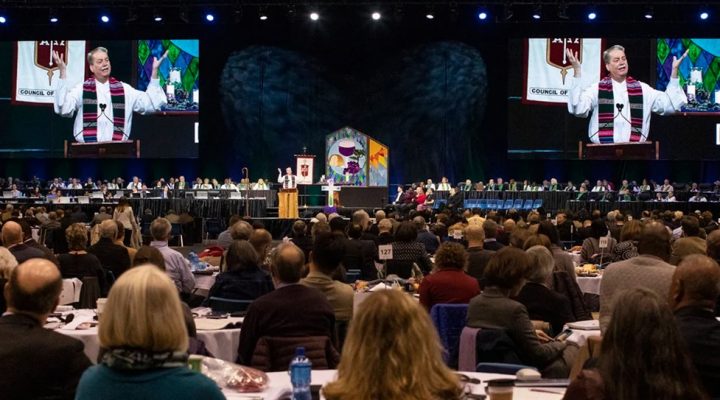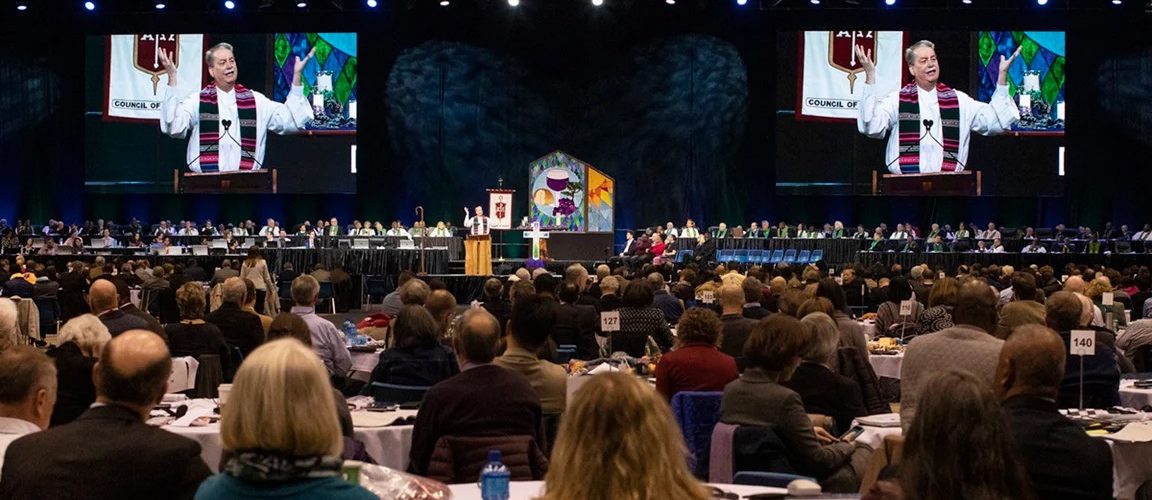Delegates to United Methodists’ first worldwide legislative assembly in five years will consider three major issues known as “the three Rs” — regionalization, Revised Social Principles and removal of “harmful language” against homosexuality.
This General Conference — technically considered the postponed 2020 session despite occurring in 2024 — will play out amid circumstances not seen since the 1968 session that confirmed the merger of the Methodist Church with the Evangelical United Brethren Church to form the current United Methodist Church. They include the departure of more than 7,000 churches and an international membership demanding more equity in governance and policies.
Hence delegates’ mood going into the April 23-May 3 General Conference in Charlotte, N.C., can be described as readiness to move beyond the break-ups of the past five years into a future that sees the UMC become more globalized but less divided than in the past. Unfortunately for the broader sense of comity, traditionalist forces are still trying to break up what’s left of the UMC.
Regionalization. Throughout much of its half-century history, the UMC has had a de facto identity as a U.S. “mother church” with international branches. While international delegates have complained often about the U.S.-centric nature of legislation and governance, special interests, particularly conservative groups, have employed what many decry as “neocolonialist” tactics to garner international delegates’ votes.
Throughout much of its half-century history, the UMC has had a de facto identity as a U.S. “mother church” with international branches.
That approach has changed since the 2019 General Conference when an African delegate, who begged anonymity for fear of retribution, told reporters U.S. conservative elements had instructed Africans to vote in favor of a plan to tighten the UMC’s anti-LGBTQ rules.
This time, however, the impetus for changing the UMC’s structure and governance emerged from United Methodists beyond the United States and has gained widespread acceptance and official endorsement. The idea had been broached previously but gained momentum after Filipino United Methodists proposed a restructure they named the Christmas Covenant.
The proposal was intended to preserve church unity while giving both the United States and its international regions more contextual authority. The Christmas Covenant also was a reaction to a separate agreement called the Protocol for Reconciliation and Grace Through Separation, which was intended to provide authority and funding for so-called “traditionalists” to start a new Methodist church.
Delays caused by the coronavirus pandemic caused the Protocol to lose support, including from some of its negotiating team, while the Christmas Covenant’s idea gained more credibility and backing. The concept was endorsed eventually by two important church bodies with international input, the Standing Committee on Central Conference Matters and the Connectional Table, the denominational commission that coordinates the UMC’s ministries.
When General Conference was postponed for a third time in 2022, the delay left the separation pact hanging without a decision, dimming traditionalists’ hopes to use United Methodist money to start their new church. So, the disgruntled leadership of the traditionalist Wesleyan Covenant Association founded a new church, the Global Methodist Church, in May 2022, setting off waves of conservative churches leaving the denomination — the opposite effect of what was intended when the exit process was enacted by the special 2019 General Conference.
As of March 22, a cohort of about 300 U.S. delegates have pledged themselves publicly to vote for regionalization. Specifically, they’re backing eight legislative proposals submitted by the Standing Committee on Central Conference Matters in collaboration with the Connectional Table and the Christmas Covenant Team.
According to the Connectional Table’s website, the petitions would:
- Call for creation of a U.S. regional conference
- Amend the Constitution to establish regions around the denomination with the ability to legislate
- Create an interim legislative body in the United States
If approved by General Conference, the legislation would require smaller units known as annual conferences also to approve the proposals, since they involve amending the church’s constitution.
Both the Standing Committee on Central Conference Matters and the Connectional Table said they applied many values to creating the legislative proposals. Among these are:
- De-centering the United States church
- Being able to legislate/make decisions that are appropriate without having to wait until General Conference
- Decolonizing mission, relationships and structure
- Providing ways for the gifts and resources of the whole church to emerge and shape the entire denomination
- Practicing trust across regions without having to dictate from one region to another
- Maintaining Wesleyan theological identity
- Centering theology and mission
- Being worldwide and contextual
- Increasing relevancy
However, traditionalist forces are making one last attempt to hold the UMC hostage to disaffiliation. Rob Renfroe, president of the traditionalist Good News caucus, asserted in a March 25 commentary on UM News that churches and conferences outside the United States haven’t had a fair chance to disaffiliate.
Thus, Good News and the Wesleyan Covenant Association are proposing General Conference extend the disaffiliation period. Renfroe says if disaffiliation is extended — meaning traditionalist forces have more chance to luring away other local churches — then Good News and the Wesleyan Covenant Association “will be inclined not to stick around and oppose regionalization proposals,” Renfroe wrote.
Revised Social Principles: The Social Principles form the heart of the UMC’s longstanding social justice tradition. However, the guidelines for Christian living also have been a major source of conflict since a floor motion at the 1972 General Conference added language holding homosexuality to be “incompatible with Christian teaching.
The Social Principles form the heart of the UMC’s longstanding social justice tradition.
Subsequent General Conference actions banned “self-avowed practicing homosexuals” from ordination as clergy; forbade church-wide funds from being used to promote homosexuality; and banned same-sex weddings being performed by United Methodist clergy or in United Methodist churches.
Despite a 1989-1992 study on homosexuality and scientific research on the spectrum of human sexuality, the UMC’s language has continued to center on same-gender orientation, primarily focused on gay men. The Revised Social Principles document seeks to resolve the UMC’s 50-year conflict over homosexuality by removing it entirely from the new guidelines. Instead, the RSP says little about human sexuality at all, revamping the guidelines into four main sections: Community of All Creation; Social Community; Economic Community; and Political Community.
The Revised Social Principles have been in preparation since 2012, with emphasis on the process of writing and editing by international teams including review by around 2,000 United Methodists around the world.
Removing “harmful” language: Advocates for full inclusion of LGBTQ poeple in the UMC have attempted to excise the phrase “incompatible with Christian teaching” and all that hangs on it since 1976. Proposals to do away with the “incompatible” language have failed at every General Conference.
This year, however, LGBTQ allies have pinned their hopes on the Revised Social Principles rather than on specific sections where the LGBTQ bans appear. It’s a tricky maneuver, but if the Revised Social Principles are adopted as presented without the “incompatible” reference, then everything that hinges on it is invalidated automatically. If the revision doesn’t make it through, there are still individual petitions to remove the anti-LGBTQ language wherever it’s found.
Related articles:
One quarter of U.S. United Methodist churches have disaffiliated
United Methodists will decide realigning church’s structure, authority in 2024


